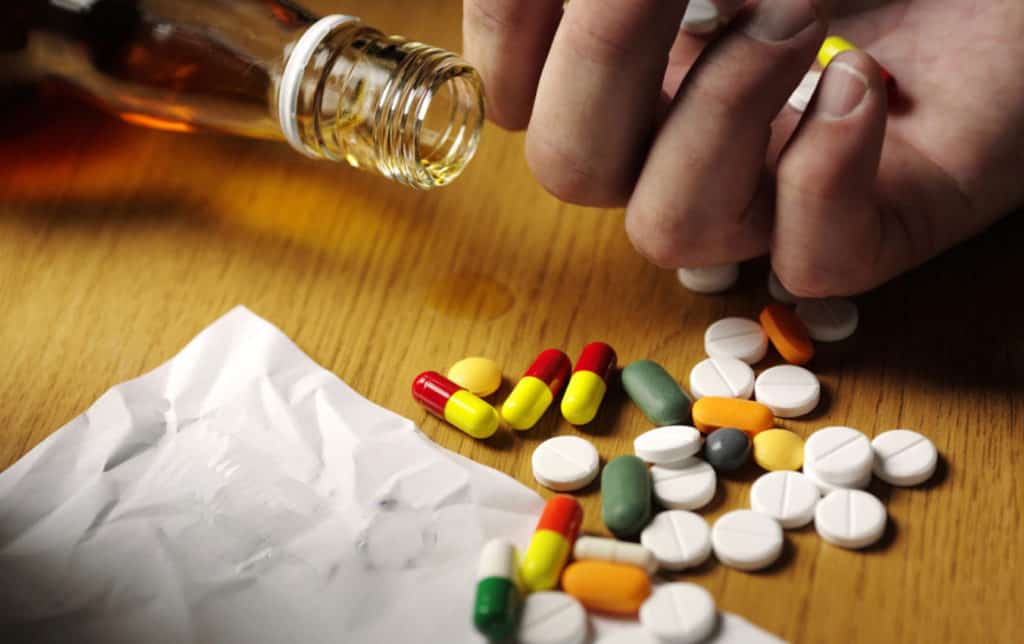How Is Soma Supposed to Be Used?
Soma, a brand name for the prescription drug carisoprodol, is a muscle relaxant legitimately prescribed to relieve pain from muscle injuries and spasms. When taken in dosages exceeding those recommended by physicians or if you mix Soma and alcohol, it causes drowsiness, giddiness, and relaxation. Soma is metabolized into meprobamate, a Schedule IV drug with a potential for substance abuse. [1]
Soma is generally safe when prescribed by a physician and used as directed. However, individuals who abuse Soma and alcohol can develop psychological addictions to the drug. Common side effects of Soma and alcohol abuse include blurred vision, dizziness, drowsiness, and loss of coordination. More serious side effects include chills, depression, racing heartbeat, tightness in the chest, vomiting, and unusual weakness. Withdrawal symptoms associated with Soma dependency include abdominal cramps, headache, insomnia, and nausea. Signs that an overdose has occurred include difficulty in breathing, shock, and coma. A Soma overdose may result in death.
Soma Street Names Are:
- Ds
- Dance
- Las Vegas Cocktail (combination of Soma and Vicodin)
- Soma Coma (combination of Soma and codeine)
Skip To:
Learn More:

Get Your Life Back
Find Hope & Recovery. Get Safe Comfortable Detox, Addiction Rehab & Dual Diagnosis High-Quality Care.
Hotline(844) 597-1011Soma Mixed With Alcohol or Mixing Carisoprodol and Alcohol
To reduce the chance of Soma and alcohol dependence, withdrawal, or abuse, Soma should be used with caution in addiction-prone patients and in patients taking other CNS depressants including alcohol, and Soma should not be used for more than two to three weeks for the relief of acute musculoskeletal discomfort. [2]
The sedative effects of Soma and other CNS depressants (e.g., alcohol, benzodiazepines, opioids, tricyclic antidepressants) may be additive. Therefore, caution should be exercised with patients who take more than one of these CNS depressants simultaneously.

Soma Muscle Relaxer And Alcohol Interaction
Patients should be advised to avoid alcoholic beverages while taking Soma and to check with their doctor before taking other CNS depressants such as benzodiazepines, opioids, tricyclic antidepressants, sedating antihistamines, or other sedatives.
Who Mixes Soma And Alcohol Together?
According to Alcohol.org, Many people believe that combining Soma and alcohol is harmless, which is not true. The effects of mixing Soma and alcohol include:
- An increased risk of seizures
- Impaired motor control
- Slowed or difficult breathing
- Problems with memory
- Drowsiness
- Dizziness
In addition to that, Soma is known in the medical community for its abuse potential. While carisoprodol is not addictive, the liver metabolizes it into meprobamate, which is the actual source of drug dependency.
Meprobamate is an antianxiety medication that is listed under the Convention on Psychotropic Substances as a Schedule IV drug. Even with short-term usage, meprobamate can cause a person to become physically dependent on it, and the withdrawal symptoms associated with the drug are similar to those of barbiturates and alcohol. [3]
Get Help. Get Better. Get Your Life Back.
Searching for Accredited Drug and Alcohol Rehab Centers Near You?
Even if you have failed previously and relapsed, or are in the middle of a difficult crisis, we stand ready to support you. Our trusted behavioral health specialists will not give up on you. When you feel ready or just want someone to speak to about therapy alternatives to change your life call us. Even if we cannot assist you, we will lead you to wherever you can get support. There is no obligation. Call our hotline today.
(844) 597-1011Why Do People Mix Soma With Alcohol?
Drinking alcohol while using other drugs isn’t safe. Alcohol is a depressant with similar effects to other downers. Mixing Soma and alcohol can increase your risk of overdose and serious damage to the brain, heart, and other organs.
Intentional polysubstance use occurs when a person takes a drug to increase or decrease the effects of a different drug or wants to experience the effects of the combination. Unintentional polysubstance use occurs when a person takes drugs that have been mixed or cut with other substances, like fentanyl, without their knowledge.
Whether intentional or not, mixing drugs is never safe because the effects of combining drugs are often stronger, more unpredictable, and even deadly.
Substance use disorder (SUD) is a chronic, relapsing disease with a highly multifaceted pathology that includes (but is not limited to) sensitivity to drug-associated cues, negative affect, and motivation to maintain drug consumption. SUDs are highly prevalent, with 35 million people meeting the criteria for SUD.
11.3% of individuals diagnosed with a SUD have concurrent alcohol and illicit drug use disorders. Furthermore, having a SUD with one substance increases susceptibility to developing dependence on additional substances. For example, the increased risk of developing heroin dependence is twofold for alcohol misusers, threefold for cannabis users, 15-fold for cocaine users, and 40-fold for prescription misusers. Given the prevalence and risk associated with polysubstance use and current public health crises, examining these disorders through the lens of co-use is essential for translatability and improved treatment efficacy. [4]

First-class Facilities & Amenities
World-class High-Quality Addiction & Mental Health Rehabilitation Treatment
Rehab Centers TourRenowned Addiction Centers. Serene Private Facilities. Inpatient rehab programs vary.
Addiction Helpline(844) 597-1011Proven recovery success experience, backed by a Team w/ History of:
15+
Years of Unified Experience
100s
5-Star Reviews Across Our Centers
10K
Recovery Success Stories Across Our Network
- Low Patient to Therapist Ratio
- Onsite Medical Detox Center
- Comprehensive Dual-Diagnosis Treatment
- Complimentary Family & Alumni Programs
- Coaching, Recovery & Personal Development Events
Dangers Of Mixing Alcohol And Soma
Many of the Soma overdoses have occurred in the setting of multiple drug overdoses (including drugs of abuse, illegal drugs, and alcohol). The effects of an overdose of Soma and other CNS depressants (e.g., alcohol, benzodiazepines, opioids, tricyclic antidepressants) can be additive even when one of the drugs has been taken in the recommended dosage. Fatal accidental and non-accidental overdoses of SOMA have been reported alone or in combination with CNS depressants.
Signs Of Soma And Alcohol Addiction
Abusers typically ingest Soma orally. Many abusers take it in combination with other drugs to enhance the effects of those drugs. Alcohol, codeine, diazepam, heroin, hydrocodone (especially Vicodin), meprobamate, and propoxyphene commonly are abused in combination with Soma. Abusers who combine Soma with Vicodin claim that this combination produces effects similar to those of heroin.
Substance use disorders are defined in the Fifth Edition of the Diagnostic and Statistical Manual of Mental Disorders (DSM-5) as a pattern of use that results in marked distress and/or impairment, with two or more symptoms occurring in the past year. The DSM-5 marked the transition of SUD from a categorical model of severity (previously defined as “abuse” or “dependence”) to a more dimensional model in which SUDs are qualified as mild, moderate, or severe, based on the number of symptoms endorsed by the patient.
DSM-5 Diagnostic Criteria For Substance Use Disorders
Substance use disorders are defined as a pattern of use that results in marked distress and/or impairment, with two or more of the following symptoms over the course of a 12-month period:
- Using the substance in larger amounts or over a longer period of time than intended
- Unsuccessful attempts or persistent desire to reduce the use
- Too much time spent on obtaining, using, and/or recovering from the effects of the substance
- A strong craving for the substance
- Significant interference with roles at work, school, or home
- Continued use despite recurrent social or interpersonal consequences
- Reducing or giving up important social, occupational, or recreational activities because of the substance use
- Substance use in situations in which it may be physically hazardous
- Substance use despite recurrent or persistent physical or psychological consequences
- Tolerance of the substance
- Withdrawal from the substance [5]
World-class, Accredited, 5-Star Reviewed, Effective Addiction & Mental Health Programs. Complete Behavioral Health Inpatient Rehab, Detox plus Co-occuring Disorders Therapy.
CALL(844) 597-1011End the Addiction Pain. End the Emotional Rollercoaster. Get Your Life Back. Start Drug, Alcohol & Dual Diagnosis Mental Health Treatment Now. Get Free No-obligation Guidance by Substance Abuse Specialists Who Understand Addiction & Mental Health Recovery & Know How to Help.
Treatment For Soma And Alcohol Addiction
Receive treatment for co-occurring disorders today.
As the addiction treatment community begins to realize that addiction is itself a mental disorder, the relationship between substance abuse and mental disorders becomes more complicated. The greater treatment community largely lacks a proper understanding of dually diagnosed conditions, so these conditions are still treated separately, or worse–not treated or diagnosed at all. We Level Up dual diagnosis treatment centers in Florida, California, Texas, and New Jersey are some of the facilities that have professionals trained to help treat co-occurring disorders concurrently. This type of tandem treatment provides some of the best success rates.
Get dual diagnosis treatment for individuals struggling with substance abuse and mental health disorders.

How We Can Help? Searched for “inpatient consultants & drug and alcohol treatment centers?” or are you seeking a national inpatient rehab destination?
We Level Up is a multi-faceted primary drug and alcohol dual diagnosis program treating secondary co-occurring mental health conditions and polysubstance abuse. We Level Up team uses evidence-based proven methods to generate cutting-edge solutions to substance abuse and behavioral health challenges. With support programs targeted towards families and individuals. We work to improve the health of the public and of individuals from every behavioral and related integrated addiction primary and mental health secondary treatment option. This includes constant research and innovation on substance abuse and integrated co-occurring mental health treatment models paired with individuals in a conducive environment.
A person with a dual diagnosis has both a mental disorder and an alcohol or drug problem. These conditions occur together frequently. About half of people who have a mental disorder will also have a substance use disorder at some point in their lives and vice versa. The interactions of the two conditions can worsen both. [6]
We Level Up counselors understand and can make a drug addiction therapy recommendation or dual diagnosis treatment best suited to your needs. You may call us today to speak with one of our treatment specialists if you’re struggling with misusing Soma and alcohol.
Experience Transformative Recovery at We Level Up Treatment Centers.
See our authentic success stories. Get inspired. Get the help you deserve.
Start a New Life
Begin with a free call to an addiction & behavioral health treatment advisor. Learn more about our dual-diagnosis programs. The We Level Up Treatment Center Network delivers recovery programs that vary by each treatment facility. Call to learn more.
- Personalized Care
- Caring Accountable Staff
- World-class Amenities
- Licensed & Accredited
- Renowned w/ 100s 5-Star Reviews
We’ll Call You
Sources:
[1] Soma Fast Facts – National Drug Intelligence Center
[2] Soma (carisoprodol) – https://www.accessdata.fda.gov/drugsatfda_docs/label/2009/011792s043lbl.pdf
[3] The Effects of Mixing Soma and Alcohol – https://www.alcohol.org/mixing-with/soma/
[4] One Is Not Enough: Understanding and Modeling Polysubstance Use – National Center for Biotechnology Information
[5] Adapted from American Psychiatric Association. Diagnostic and Statistical Manual of Mental Disorders (DSM-5®). Washington, DC: American Psychiatric Publishing; 2013.
[6] Dual Diagnosis – U.S. Department of Health and Human Services National Institutes of Health


